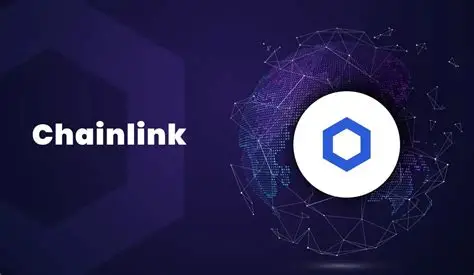In this article, I will discuss Best Alternatives to Chainlink for Decentralized Oracles. Different platforms now provide off-chain data for various reasons, ranging from a need for privacy to cross-chain data feeds.
For DeFi and smart contracts, these alternatives offer a great deal of value. The solutions are sensitive to the developers’ needs and are reliable when it comes to meeting different market demands.
Key Point & Best Alternatives to Chainlink for Decentralized Oracles List
| Oracle Protocol | Key Points |
|---|---|
| Band Protocol | Cross-chain data oracle; fast, scalable; supports multiple blockchains. |
| API3 | Decentralized API integration; dAPI model; data transparency focus. |
| Witnet | Trustless oracle network; incentive-driven; supports smart contracts. |
| Nest Protocol | Price oracle with on-chain computation; low-cost data feeds; secure. |
| Chronicle Protocol | Real-time data feeds; privacy-preserving; scalable oracle solution. |
| SupraOracles | High-speed oracle network; enterprise-grade reliability; multi-chain. |
| Pyth Network | Market data-focused oracle; low latency; integrates with DeFi platforms. |
1.Band Protocol
Band Protocol stands out as one of the best alternatives to Chainlink as a decentralized oracle because of its cross-chain interoperability and rapid data throughput. Unlike traditional oracles, Band decentralized oracles aggregate data on-chain, enhancing the precision of data validation needed for smart contracts.
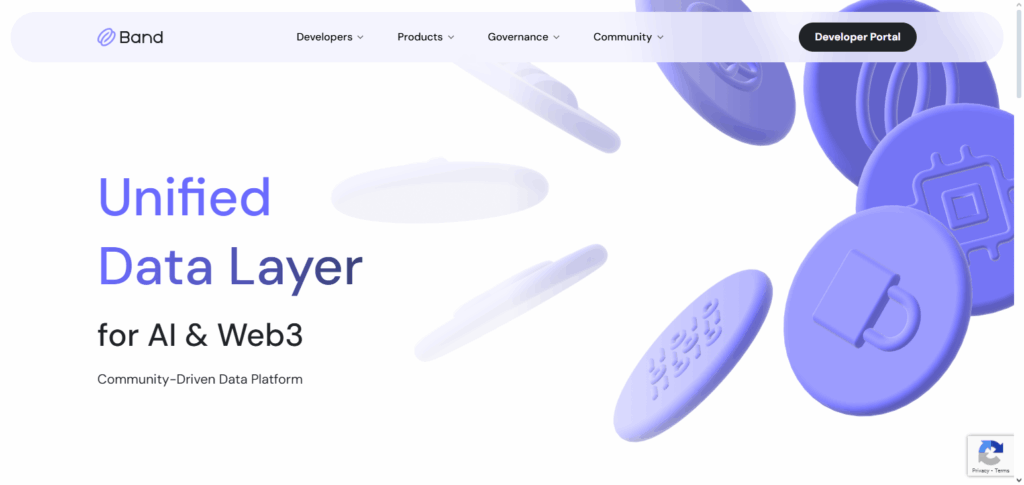
Its specific consensus algorithm is effective, economical, and scalable, making it suitable for use in DeFi and blockchain industries. With real-time data refreshes and robust security, Band Protocol offers blockchain developers a reliable and flexible solution for decentralized oracle services.
| Feature | Details |
|---|---|
| Oracle Name | Band Protocol |
| Purpose | Decentralized cross-chain data oracle |
| KYC Requirement | Minimal / Not required for basic use |
| Supported Blockchains | Ethereum, Binance Smart Chain, Cosmos, others |
| Data Sources | Aggregates multiple on-chain and off-chain sources |
| Consensus Mechanism | Delegated Proof-of-Stake (DPoS) |
| Use Cases | DeFi apps, prediction markets, smart contract data feeds |
| Unique Advantage | Fast, scalable, and reliable cross-chain data delivery |
| Security | Decentralized validation and staking ensure data accuracy |
2.API3
API3 emerges as a strong competitor to Chainlink for decentralized oracles as it links APIs to smart contracts using dAPIs, dAPI model. This removes all intermediaries, ensuring the maintained middleground along with trustlessness, integrity, and transparency. By servicing first-party oracles, it solves the problem of exposing developers to modern first world data.
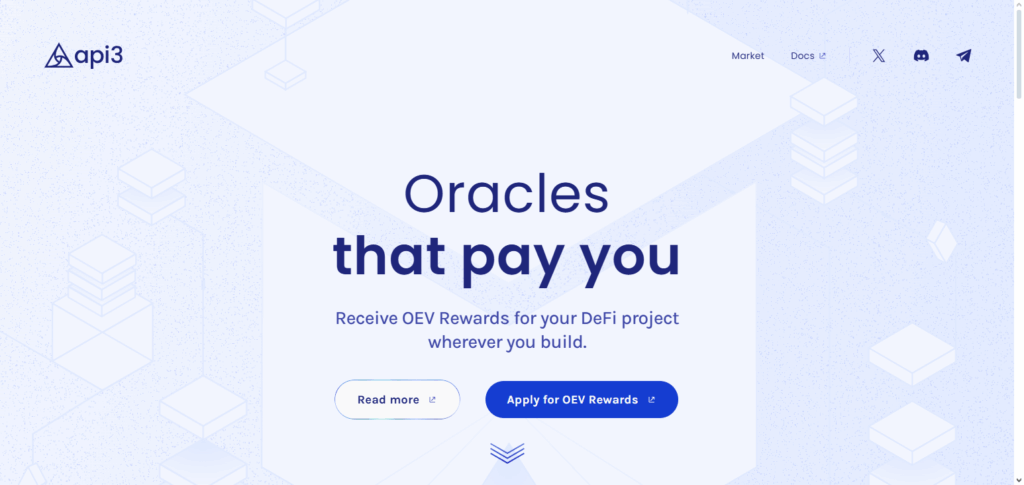
API3 is a perfect fit for DeFi projects or other blockchain apps that require trustless information and decentralized data on multiple blockchains, providing real-time data feeds in a lightweight, cost-efficient, and scalable package.
| Feature | Details |
|---|---|
| Oracle Name | API3 |
| Purpose | Decentralized API connectivity for smart contracts |
| KYC Requirement | Minimal / Not required for standard use |
| Supported Blockchains | Ethereum, Polygon, Binance Smart Chain, Avalanche |
| Data Sources | Direct API integration via first-party oracles |
| Consensus Mechanism | DAO-governed, decentralized API monitoring |
| Use Cases | DeFi applications, on-chain data feeds, enterprise smart contracts |
| Unique Advantage | Direct API-to-smart-contract connection ensures data integrity |
| Security | Transparency and decentralized verification reduce manipulation risks |
3.Witnet
Witnet stands out as one of the best substitutes of Chainlink due to the fact that Witnet is a fully decentralized and trustless network that operates as an incentive driven oracle. Witnet guarantees accuracy, reliability, and data delivery to the smart contracts by allowing data providers to stake tokens.
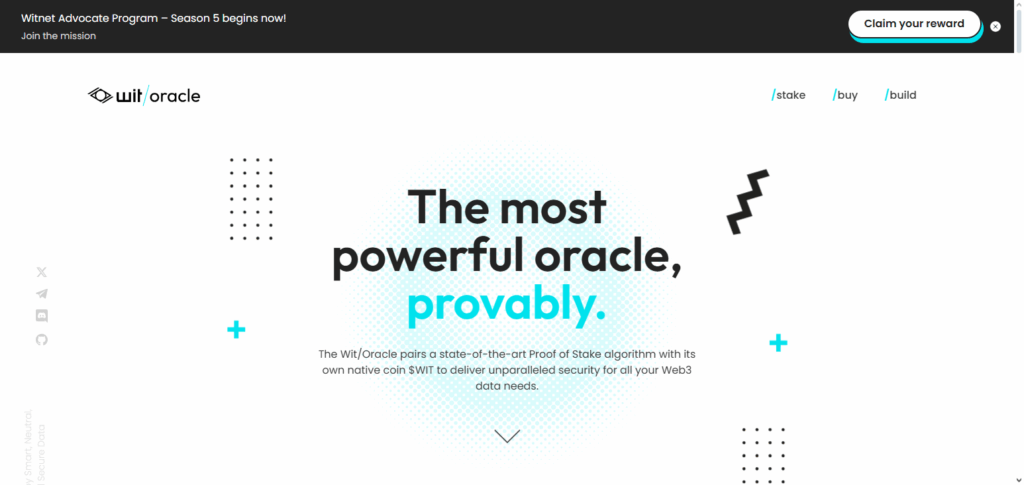
Witnet is highly secure as well as transparent because it does not use any middlemen in the process of fetching, verifying, and aggregating off-chain information. According to Witnet, their focus on community driven data validation combined with their lightweight framing makes it an attractive and scalable decentralized oracle services.
| Feature | Details |
|---|---|
| Oracle Name | Witnet |
| Purpose | Trustless decentralized oracle network |
| KYC Requirement | Minimal / Not required for standard use |
| Supported Blockchains | Ethereum, Binance Smart Chain, Polygon, others |
| Data Sources | Off-chain data verified and aggregated by network participants |
| Consensus Mechanism | Staking-based, incentive-driven verification |
| Use Cases | DeFi applications, smart contract data feeds, decentralized apps |
| Unique Advantage | Fully trustless and community-validated data delivery |
| Security | Decentralized verification and economic incentives prevent manipulation |
4.Nest Protocol
Nest Protocol stands out as a competitor to Chainlink for decentralized oracles, as it uses on-chain price discovery systems for trustless data feeds. Users submitting and verifying prices on-chain allows NEST to reduce dependence on outside firms and helps protect against collusion.
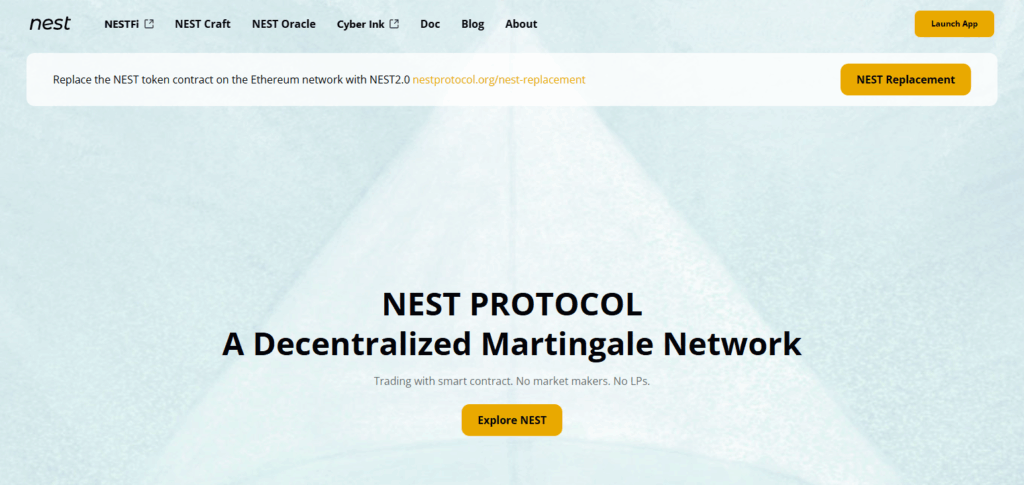
NEST provides low-cost, real-time price updates and a decentralized accuracy-assured feedback system which enhances data reliability. This is especially important for DeFi applications which are in search of efficient, scalable, and tamper-proof oracle systems.
| Feature | Details |
|---|---|
| Oracle Name | Nest Protocol |
| Purpose | On-chain price oracle for secure and accurate data feeds |
| KYC Requirement | Minimal / Not required for standard use |
| Supported Blockchains | Ethereum, Binance Smart Chain, Polygon |
| Data Sources | User-submitted on-chain price data verified by protocol mechanisms |
| Consensus Mechanism | Decentralized staking and verification |
| Use Cases | DeFi price feeds, smart contract pricing, decentralized trading |
| Unique Advantage | On-chain price discovery ensures transparency and manipulation resistance |
| Security | Economic incentives and decentralized verification ensure data integrity |
5.Chronicle Protocol
Chronicle Protocol excels as a competitor to Chainlink in the field of decentralized oracles due to its specialization in privacy-preserving and real-time data streaming. Unlike traditional oracles, Chronicle guarantees confidentiality of sensitive data while providing accurate and tamper-proof data streams to smart contracts.
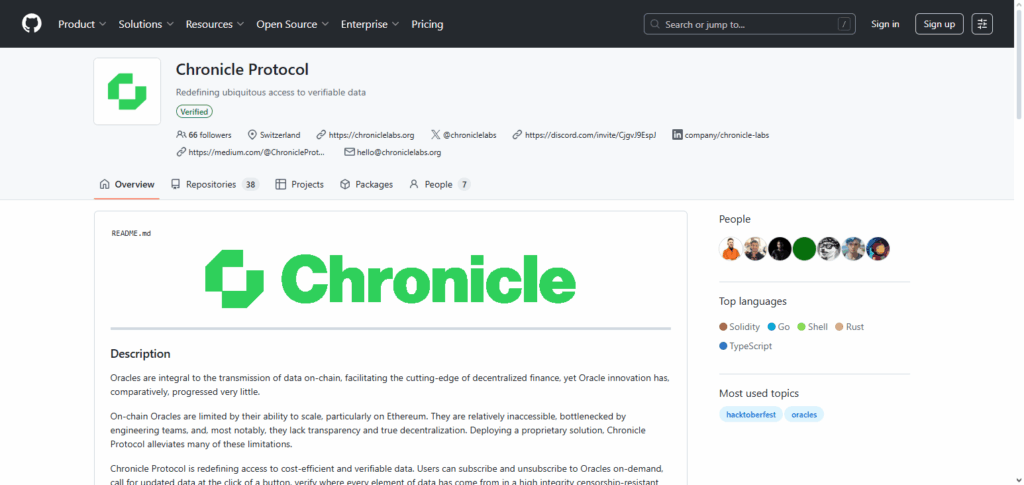
Its architecture is scalable and can support the integration of several blockchains, which is advantageous for both emerging and established applications. With its combination of fast, secure, and private data streams, Chronicle Protocol guarantees that developers can access off-chain data with no risk to confidentiality or operational efficiency.
| Feature | Details |
|---|---|
| Oracle Name | Chronicle Protocol |
| Purpose | Privacy-preserving, real-time decentralized oracle |
| KYC Requirement | Minimal / Not required for standard use |
| Supported Blockchains | Ethereum, Binance Smart Chain, Polygon, other EVM-compatible chains |
| Data Sources | Aggregates off-chain data while preserving privacy |
| Consensus Mechanism | Decentralized verification with privacy-focused protocols |
| Use Cases | DeFi apps, confidential smart contracts, real-time data feeds |
| Unique Advantage | Combines speed, scalability, and privacy for secure data delivery |
| Security | Decentralized validation ensures tamper-resistant and reliable data |
6.SupraOracles
SupraOracles stands out as a decentralized oracle alternative to Chainlink due to its focus on high-speed, cross-chain, enterprise-grade data servicing. The distinct design of SupraOracles permits the infusion of low-latency data streams which ensures real-time data delivery for time-sensitive applications, coupled with high security, making it suitable for any enterprise-grade applications.
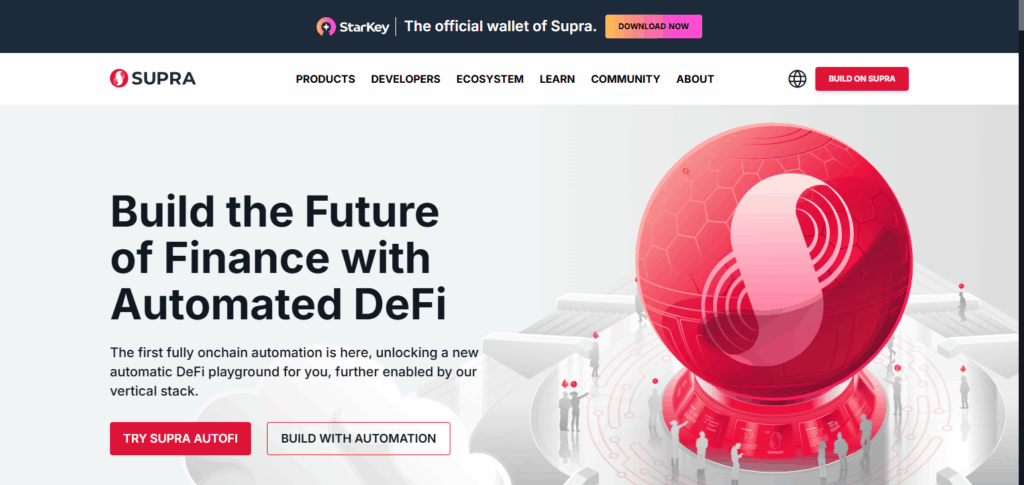
Moreover, SupraOracles enables the off-chain data to be obtained with no latency which ensures no delays for the programmers, hence allows extensive adaptive integration. Considering its reliability and performance, along with its cross-chain support, it enables advanced solutions for modern DeFi and blockchain applications.
| Feature | Details |
|---|---|
| Oracle Name | SupraOracles |
| Purpose | High-speed, enterprise-grade decentralized oracle |
| KYC Requirement | Minimal / Not required for standard use |
| Supported Blockchains | Ethereum, Binance Smart Chain, Solana, Polygon, other major chains |
| Data Sources | Aggregates reliable off-chain data from multiple providers |
| Consensus Mechanism | Decentralized verification with enterprise-grade reliability |
| Use Cases | DeFi, trading platforms, real-time smart contract feeds |
| Unique Advantage | Combines low-latency data delivery with multi-chain compatibility |
| Security | Robust decentralized validation ensures accurate and tamper-resistant data |
7.Pyth Network
Pyth Network stands out as a competitor to Chainlink in the field of decentralized oracles as it focuses on low latency delivery of market-critical, high-frequency data. It has carved a niche among decentralized finance (DeFi) applications as it captures, validates, and aggregates data streams from trading firms and exchanges.
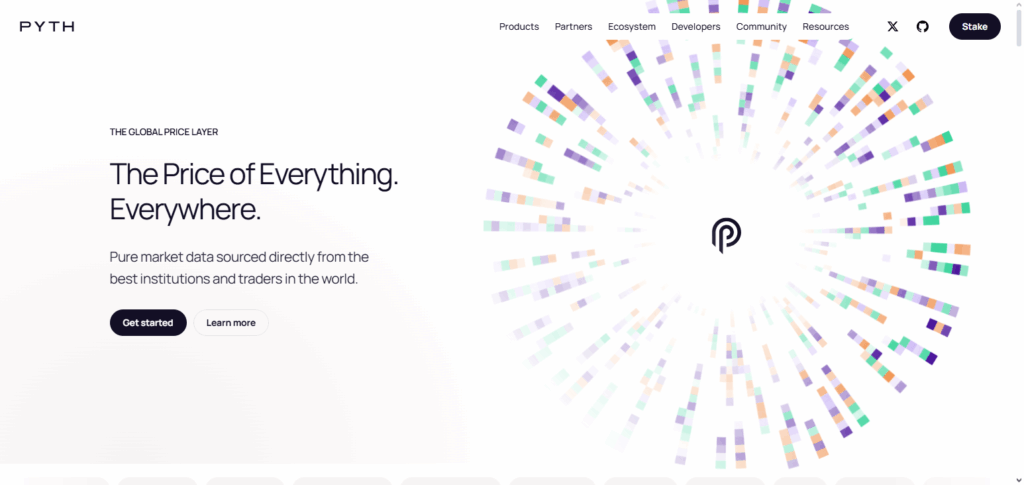
Pyth’s low latency architecture offers near real-time price updates which benefit time-sensitive smart contracts. By ensuring accuracy, Pyth Network reduces the risks for developers, shielding them from potential losses in situations where speed, precision, and trust in the oracle is vital for intricate operations involving the blockchain and financial markets.
| Feature | Details |
|---|---|
| Oracle Name | Pyth Network |
| Purpose | Market data-focused decentralized oracle |
| KYC Requirement | Minimal / Not required for standard use |
| Supported Blockchains | Solana, Ethereum, Polygon, other major chains |
| Data Sources | Direct feeds from trading firms and exchanges for accurate pricing |
| Consensus Mechanism | Aggregation of verified market data across multiple sources |
| Use Cases | DeFi price feeds, real-time trading data, smart contracts |
| Unique Advantage | Low-latency, high-frequency financial data for time-sensitive apps |
| Security | Decentralized verification ensures tamper-resistant, reliable data |
Conclusion
In conclusion, there are a number of valid approaches to oracle solutions that are different from Chainlink and come with their own advantages. With Band protocol, you get swift and cross-chain data feeds while API3 enables direct API connections with smart contracts which promotes transparency. Witnet supplies data that has been validated by the community, allowing for trustless data, while Nest provides on-chain price accuracy.
Chronicle provides privacy-preserving real-time feeds, while supraoracles cements their place with high-speed, enterprise-grade data reliability. Pyth network excels in market-focused, low-latency data. These offered platforms work beyond Chainlink and work to give developers reliable oracle resources that are flexible, safe, and scalable.
FAQ
What are decentralized oracles?
Decentralized oracles are services that provide smart contracts with reliable off-chain data, ensuring security and accuracy without relying on a single source.
Why consider alternatives to Chainlink?
Alternatives can offer faster data delivery, lower costs, privacy features, cross-chain support, or specialized market data that better suit specific blockchain applications.
Which are the top alternatives to Chainlink?
Band Protocol, API3, Witnet, Nest Protocol, Chronicle Protocol, SupraOracles, and Pyth Network.



